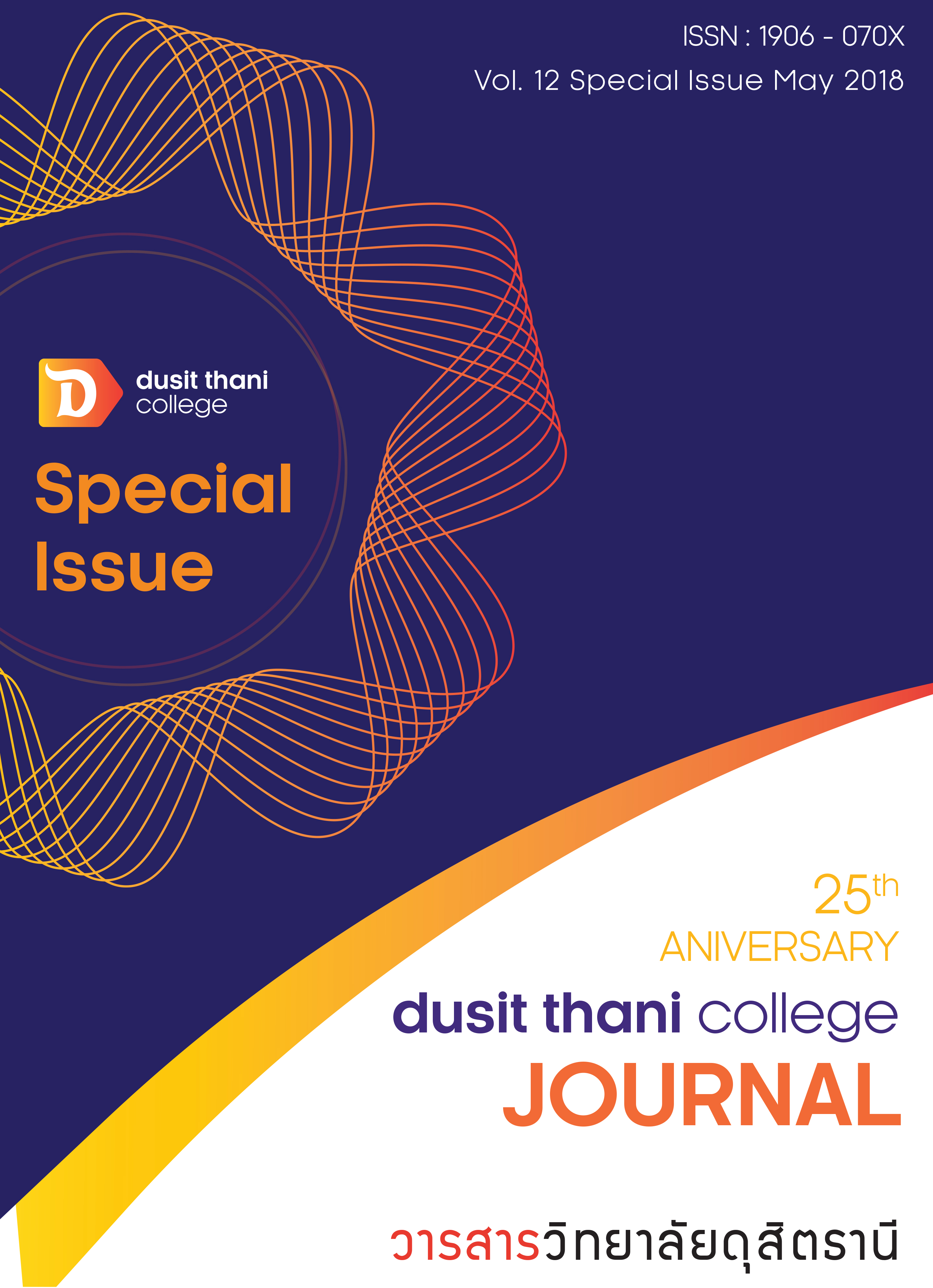การศึกษาการเรียนรู้ที่มุ่งผลลัพธ์ในการปฏิบัติการเรียนการสอนในหลักสูตรการจัดการโรงแรมและรีสอร์ทของวิทยาลัยดุสิตธานี
Main Article Content
บทคัดย่อ
การวิจัยนี้มีวัตถุประสงค์เพื่อศึกษาการใช้การสอนและการเรียนรู้ที่มุ่งผลลัพธ์ในการปฏิบัติการเรียนการสอน และเพื่อเสนอกรอบในการนำแนวทางการสอนและการเรียนรู้ที่มุ่งผลลัพธ์ไปใช้สำหรับหลักสูตรการจัดการโรงแรมและรีสอร์ทของวิทยาลัยดุสิตธานี การวิจัยนี้ใช้วิธีการวิจัยแบบผสมโดยใช้การสำรวจออนไลน์และการอภิปรายกลุ่มย่อย การวิเคราะห์ข้อมูลใช้สถิติเชิงพรรณนาและการวิเคราะห์เนื้อหา ผลการวิจัยพบว่าวิธีการสอนและการเรียนรู้ที่มุ่งผลลัพธ์ถูกใช้ในกิจกรรมการเรียนการสอนบางส่วน โดยมีความจำเป็นที่จะต้องมีกรอบโครงสร้างเพื่อจัดระเบียบการศึกษาตามแนวทางการศึกษาที่มุ่งผลลัพธ์ นอกจากนี้กรอบการจัดการเรียนรู้ที่เสนอยังเน้นถึงความจำเป็นในการเผยแพร่ข้อมูลระหว่างผู้มีส่วนได้ส่วนเสีย การจัดโครงสร้างที่เป็นรูปธรรม การเสริมสร้างศักยภาพ และการนำไปปฏิบัติและการประเมินผลตลอดจนการปรับปรุงอย่างต่อเนื่อง
Article Details
นโยบายการพิจารณากลั่นกรองบทความ
- บทความวิจัยและบทความวิชาการทุกเรื่องที่จะได้รับการตีพิมพ์ต้องผ่านการพิจารณากลั่นกรองโดยผู้ทรงคุณวุฒิ (Peer Review) ในสาขาที่เกี่ยวข้อง จำนวน 3 ท่าน/บทความ
- บทความ ข้อความ ภาพประกอบและตารางประกอบที่ลงตีพิมพ์ในวารสารเป็นความคิดเห็นส่วนตัวของผู้เขียน กองบรรณาธิการไม่จำเป็นต้องเห็นด้วยเสมอไป และไม่มีส่วนรับผิดชอบใด ๆ ถือเป็นความรับผิดชอบของผู้เขียนแต่เพียงผู้เดียว
- บทความที่จะได้รับการตีพิมพ์จะต้องไม่เคยตีพิมพ์ เผยแพร่ที่ใดมาก่อน และไม่อยู่ระหว่างการพิจารณาของวารสารฉบับอื่น หากตรวจสอบพบว่ามีการตีพิมพ์ซ้ำซ้อน ถือเป็นความรับผิดชอบของผู้เขียนแต่เพียงผู้เดียว
- บทความใดที่ผู้อ่านเห็นว่าได้มีการลอกเลียนหรือแอบอ้างโดยปราศจากการอ้างอิง หรือทำให้เข้าใจผิดว่าเป็นผลงานของผู้เขียน กรุณาแจ้งให้กองบรรณาธิการวารสารทราบจะเป็นพระคุณยิ่ง
เอกสารอ้างอิง
Biggs, J. (n.d.). Constructive Alignment. Retrieved from https://www.johnbiggs.com.au/academic/constructive-alignment/
Borsoto, et al. (2014). Status of implementation and usefulness of outcomes-based education in the engineering department of an Asian university. International Journal of Multidisciplinary Academic Research,14-25. Retrieved from https://www.multidisciplinaryjournals.com/wp-content/uploads/2014/09/STATUS-OF-IMPLEMENTATION-AND-USEFULNESS-OF-OUTCOMES-BASED-EDUCATION-IN-THE-ENGINEERING-DEPARTMENT-OF-AN-ASIAN-UNIVERSITY.pdf
Castillo R. (2014). A paradigm shift to outcomes-based higher education: policies, principles and preparations. International Journal of Sciences: Basic and Applied Research, 174-186. Retrieved from https://gssrr.org/index.php?journal=JournalOfBasicAndApplied&page=article&op=view&path5B5D=1809&path5B5D=1607
Chu, S. (2010). Applying outcomes-based teaching and learning framework in the BSc Information Management Program in the Faculty of Education. Centre for information Technology in Education, The University of Hong Kong
Kember, D. (2005). Best practice in outcomes-based teaching and learning at The Chinese University of Hong Kong. Retrieved from https://www.cuhk.edu.hk/clear/download/oba_goodpractice_feb06.pdf
La Lopa, J. and Wray, M. (2013). Student Reflections on Good & Bad Teaching Among Undergraduate Hospitality and Tourism Management Students. Journal of Tourism Research & Hospitality. Retrieved from https://www.4hoteliers.com/features/article/8736
Lam, S. (2009). Outcome-Based Approach to Teaching, Learning, and Assessment in Geomatics Higher Education: The Hong Kong Experience. Retrieved from https://www.fig.net/resources/proceedings/fig_proceedings/fig2009/ppt/ts07d/ts07d_lam_ppt_3461.pdf
Llanes, C. (n.d.). Adoption of Outcomes-Based Education in the Philippines: THE T.I.P. Experience. Retrieved from https://conference.ntu.edu.sg/asaihl/Documents/PPTs/Parallel%20Session%20PPT/4_1_1%20Cynthia%20C.%20Llanes.pdf
Maher, A. (2004). Learning Outcomes in Higher Education: Implication for Curriculum Design and Student Learning. Journal of Hospitality, Leisure, Sport and Tourism Education. Retrieved from https://pdfs.semanticscholar.org/ec91/fb532f91cfca48d9e93e69188e058c825476.pdf
Mejia et al. (2014). Best practices of the Lyceum of the Philippines University and Dusit Thani tie up: Inputs to program competitiveness. Procedia-Social and Behavioral Sciences, 144, 306-312. Retrieved from https://ac.els-cdn.com/S1877042814042281/1-s2.0-S1877042814042281-main.pdf?_tid=bab876f0-730c-11e5-8a9c-00000aacb35e&acdnat=1444893601_2bc8b933c1515be7f2e697ac4688abcc
Ngidi, T. (2006). Educators Implementation of Assessment on Outcomes-Based Education. Retrieved from https://uzspace.uzulu.ac.za/handle/10530/521
Spady W. (1994). Outcome-based education: Critical issues and answers. Arlington VA: American Association of School Administrators. Retrieved from https://files.eric.ed.gov/fulltext/ED380910.pdf
Pacific Policy Research Center. (2010). 21st Century Skills for Students and Teachers. Honolulu: Kamehameha Schools, Research & Evaluation Division.
Research Methods. Retrieved from https://resourcecentre.foodrisc.org/surveys_32.html


